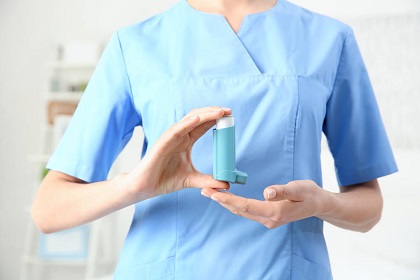Search
Related Articles

How to use Accuhaler
Step 1: Open• Hold your Accuhaler in one hand with the dose-counter
How to Use a Metered-Dose Inhaler and a Spacer
WHAT YOU NEED TO KNOW:What is a metered-dose inhaler and a spacer?A
Athletes’ Cardiorespiratory Functional Assessmen
Have you ever felt discomfort during exercise like shortness of brea
What is COPD?
COPD stands for chronic obstructive pulmonary disease. People who cough up a lot of mucus or have trouble breathing out used air may have COPD. If it is hard for you to breathe out used air, it is also hard for fresh, healthy air to come in to your lungs.
To understand COPD, you need to know how your lungs work. When you breathe in air through your nose or mouth, the air travels down your windpipe (also called trachea) into your lungs. In your lungs, airways (called the bronchial tubes) branch out like an upside-down tree. At the end of each branch are many little air sacs (called alveoli). The air you breathe travels down these airways into the air sacs. The air sacs have very thin walls full of tiny blood vessels (called capillaries). From these blood vessels, oxygen moves into your bloodstream while carbon monoxide (used air) goes out of your blood.
What happens to the lungs when you have COPD?
In healthy lungs, the airways are clear and open and the air sacs are small, elastic and springy. When you breathe in, each air sac fills up with air like a small balloon, and when you breathe out, the balloon deflates and air goes out. When you have COPD, changes occur in the airways and the air sacs. These changes happen because of two related kinds of lung disease that are part of COPD.
Chronic bronchitis makes your airways red and swollen (inflamed). Mucus collects in your airways and clogs them up.This is why it is hard for people with chronic bronchitis to breathe.
Emphysema injures your air sacs, leaving scar tissue that makes them stiff. Because of this, people with emphysema have trouble getting oxygen into their blood and carbon monoxide out of their blood.
Some people have chronic bronchitis that leads to COPD. Others get COPD as a result of emphysema. What happens to your lungs when you have chronic bronchitis may be different from what happens when you have emphysema. But either way the treatment for COPD is the same.
How does my doctor know I have COPD?
The symptoms of COPD are:
• A chronic, persistent cough
• Increased mucus
• Shortness of breath, especially during physical activity
• Wheezing
• A tight feeling in the chest
If you have these symptoms, your doctor will want to test for COPD. Your doctor will probably refer you for pulmonary function tests to see how well your lungs are working. In this test, you take deep breaths and then blow into a machine. The machine measures how deeply you can breathe and how fast you can move air in and out of your lungs. In most cases, this test (called a spirometry test) is all the doctor needs to make a diagnosis. In some cases, the doctor might also suggest a chest x-ray. The x-ray cannot tell that you have COPD but it can show signs of COPD.
What causes COPD?
Most people get COPD because they smoke cigarettes. Sometimes, people can get it even if they do not smoke. It is not yet known whether second-hand smoke can lead to COPD but people who live with or work with smokers are more likely to have respiratory diseases in general. People who breathe in large amounts of chemical fumes or dust at work or at home may also be at risk for COPD. COPD runs in some families, making people in those families more likely to get COPD, especially if they smoke.
What can I do if I have COPD?
If you have COPD and you smoke, the most important thing you can do is stop smoking. This can stop or at least slow down the damage to your lungs. Talk with your doctor or nurse about how to stop smoking. Your doctor or nurse can help you stop. If you quit smoking soon, you will feel better and have a better chance of living longer.
What will my doctor do to treat COPD?
If you have bothersome symptoms due to COPD, your doctor will probably want you to use at least one inhaler, and may be several. The medicine in inhalers helps soothe and relax your airways. The two most commonly used medicines are:
• Bronchodilators - medicines that help open the air ways in the lungs
• Corticosteroids - medicines that reduce swelling in the airways
Your doctor will talk with you about what is best for you.
Your doctor may also want you to take part in a pulmonary rehab program. Pulmonary rehab programs combine education and exercises classes to help you live better - and breathe better - with COPD. Some pulmonary rehab programs also help you to quit smoking. Because you have COPD, your insurance policy should cover pulmonary rehab but it’s a good idea to check with your insurer to find out what kinds of programs are covered.
Some people with COPD need to take oxygen. You breathe the oxygen through tubes that you put in your nose or through a mask that fits over your mouth and nose. In very serious cases of COPD, people might have surgery. Surgery is usually done when someone has not done well with other treatments.
What else can help?
If you have COPD, you might be more likely to get cold sand flu. So it's a good idea to have a flu shot every year. You should also have a pneumonia shot. You are less likely to get the flu or pneumonia if you have these shots.
It is also a good idea to
• Keep your weight normal. If you weigh too much, your lungs and heart have to work harder
• Get some exercise. Ask your doctor what kind of exercise - and how much - is right for you
• Eat a healthy diet. Eat several small meals during the day. It makes breathing easier
• Pace your activities so that you do not make your lungs work too hard
• Try to relax. Ask your doctor about ways to relax and reduce stress
• Ask your family and friends for help and emotional support
This document is not a substitute for your care team's medical advice and should not be relied upon for treatment for specific medical conditions.
©2017 The General Hospital Corporation.
Primary Care Office ln Site
developed by the MGH Laboratory of Computer Science and Division of General Internal Medicine
Click the link for more information on Respiratory Medicine Clinical Service








